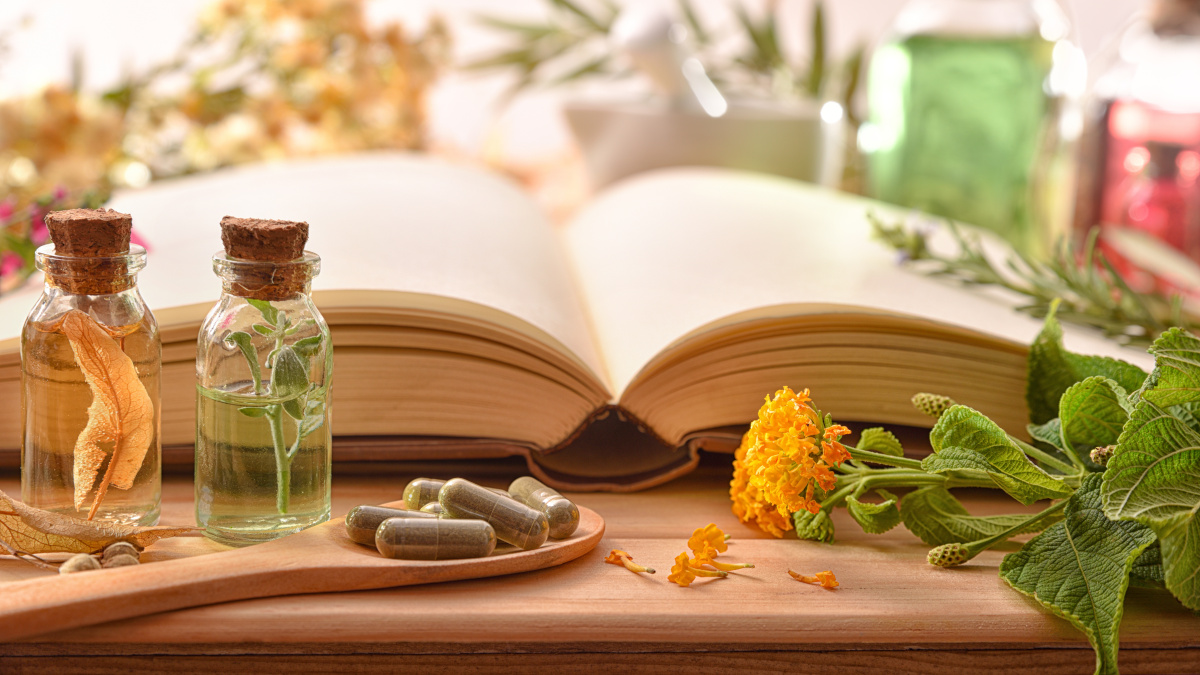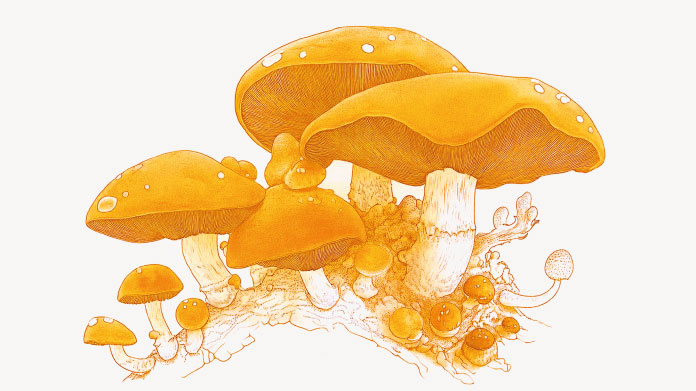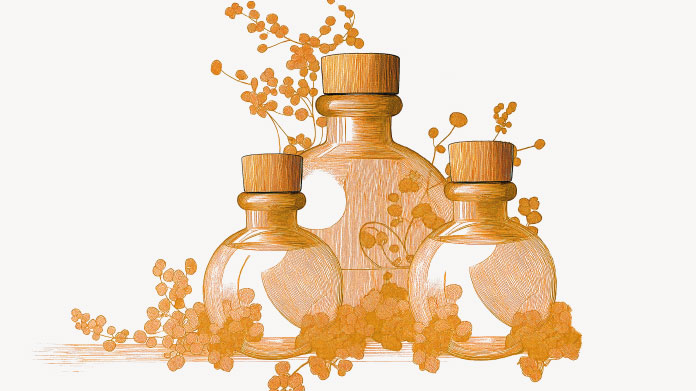
1) Astragalus plays a role in the body’s defences
A potent medicinal plant from the Fabaceae family, astragalus is a large genus of many different species. Specifically, it is the Astragalus membranaceus variety which has been used for thousands of years in traditional Chinese medicine... and is still used today in its modern equivalent.
Rich in polysaccharides, saponins and flavonoids, this particular variety of astragalus directly supports immune health. It plays a role in:
- defending the body against external aggressors;
- maintaining physical and mental strength ;
- protecting cells and tissues against free radicals ;
- maintaining normal blood pressure and a healthy microvascular system (1-3).
The extraordinary properties of Astragalus membranaceus have earned it the name ‘huang qi’ in Chinese, which means ‘booster of energy flow’.
This plant is usually consumed as a herbal tea, soup or dietary supplement (such as Astragalus Extract).
2) Cat’s claw and immunity
Cat’s claw, or Uncaria tomentosa to give it its scientific name, is a species of liana native to Peru. Its name comes from the small, curved claw-like stipules at the base of its leaves. Used for more than 2000 years, this plant is considered sacred by many Amazon rainforest peoples such as the Ashaninka and Campo.
Cat’s claw contains multiple alkaloids, triterpene glycosides, flavonoids, tannins... which are responsible for its benefits. The plant is known for its ability to support the immune system (4-6).
Since the 1990s, this Peruvian vine has continued to grow in popularity in Europe and North America.
If you’d like to benefit from the virtues of this jungle plant , one option is to prepare a decoction from the dried inner bark of cat’s claw, which has first been reduced to a powder. Alternatively, to prevent any possibility of dosage errors, you could take a cat’s claw supplement, in the form of pre-dosed capsules (such as AC-11®).
3) The effect of ginseng on the immune system and vitality
Part of the Araliaceae family, ginseng (or Panax ginseng) is the fundamental medicinal plant of traditional Asian medicine. The significant effects of ginseng root, which can sometimes resemble the shape of a man, were particularly prized by Chinese emperors.
Ginseng contains a sizeable amount of ginsenosides (also known as ‘panaxosides’), triterpenoids, polysaccharides, vitamins... As a result, it helps to:
- support the immune system;
- maintain good cognitive performance ;
- maintain good sexual activity;
- maintain vitality and prevent fatigue (7-9).
With its many virtues, it is often referred to as the ‘root of long life’. To benefit from its effects on immunity, you can take a course of dietary supplements with a high content of active ingredient , such as Ginseng 30% (standardised to 30% ginsenosides).
It is advisable to take ginseng in the morning
4) Echinacea for the defence system and upper respiratory tract
Echinacea hails neither from the Peruvian jungle nor China. This pink-flowered plant, which belongs to the Asteraceae family, first emerged in North America. It is the Echinacea purpurea species, in particular, which is used for medicinal purposes. It was even considered by Native Americans to be their most significant plant.
Echinacea purpurea is abundant in alkylamides, phenolic compounds, and alkaloids... A biological treasure trove, it thus supports:
- normal function of the natural defence system ;
- a healthy upper respiratory tract (helping to soothe sore mouths and throats, conferring a pleasant effect in the throat and vocal cords...) ;
- a healthy lower urinary tract(10-12).
How should echinacea be consumed? You have the option of either herbal teas, standardised solid extracts or nutritional supplements (such as Immunity Booster, a synergistic formulation which combines echinacea, beta-glucans, vitamin C and zinc).
5) The benefits of turmeric for the immune system
The last plant on this (by no means exhaustive) list, turmeric is well-known as a key ingredient in the blend of Indian spices used in various curries. In Europe too, references to turmeric date back to ancient times, but it was only in the 18th century that it began to be imported on a large scale.
Like ginseng, it is the plant’s root (or rhizome) which is generally used in cooking and in naturopathy.
Many of turmeric’s benefits come from the compound curcumin, a polyphenol pigment which is also responsible for the plant’s yellow-orange colour. This exceptionally powerful plant helps to:
- maintain immune system efficacy and resistance to allergies ;
- support nervous system function;
- maintain good liver health ;
- support healthycirculation ;
- and maintain healthy skin(13-15).
While you can consume turmeric root fresh (or in powdered form), you can also significantly increase your intake by taking a turmeric extract with a high curcuminoid content (such as Natural Curcuma, which is particularly rich in curcumin and other beneficial curcuminoids).
References
- Qin Q, Niu J, Wang Z, Xu W, Qiao Z, Gu Y. Astragalus embranaceus extract activates immune response in macrophages via heparanase. Molecules. 2012;17(6):7232-7240. Published 2012 Jun 13. doi:10.3390/molecules17067232
- Li ZX, Zhao GD, Xiong W, et al. Immunomodulatory effects of a new whole ingredients extract from Astragalus: a combined evaluation on chemistry and pharmacology. Chin Med. 2019;14:12. Published 2019 Mar 27. doi:10.1186/s13020-019-0234-0
- EFSA Register of Questions - Europa EU
- Domingues A, Sartori A, Valente LM, Golim MA, Siani AC, Viero RM. Uncaria tomentosa aqueous-ethanol extract triggers an immunomodulation toward a Th2 cytokine profile. Phytother Res. 2011 Aug;25(8):1229-35. doi: 10.1002/ptr.3549. Epub 2011 Jun 8. PMID: 21656603.
- Yunis-Aguinaga J, Claudiano GS, Marcusso PF, Manrique WG, de Moraes JR, de Moraes FR, Fernandes JB. Uncaria tomentosa increases growth and immune activity in Oreochromis niloticus challenged with Streptococcus agalactiae. Fish Shellfish Immunol. 2015 Nov;47(1):630-8. doi: 10.1016/j.fsi.2015.09.051. Epub 2015 Oct 3. PMID: 26434713.
- EFSA Register of Questions - Europa EU
- Kang S, Min H. Ginseng, the 'Immunity Boost': The Effects of Panax ginseng on Immune System. J Ginseng Res. 2012 Oct;36(4):354-68. doi: 10.5142/jgr.2012.36.4.354. PMID: 23717137; PMCID: PMC3659612.
- Saba E, Lee YY, Kim M, Kim SH, Hong SB, Rhee MH. A comparative study on immune-stimulatory and antioxidant activities of various types of ginseng extracts in murine and rodent models. J Ginseng Res. 2018;42(4):577-584. doi:10.1016/j.jgr.2018.07.004
- EFSA Register of Questions - Europa EU
- Manayi A, Vazirian M, Saeidnia S. Echinacea purpurea: Pharmacology, phytochemistry and analysis methods. Pharmacogn Rev. 2015;9(17):63-72. doi:10.4103/0973-7847.156353
- Zhai Z, Liu Y, Wu L, Senchina DS, Wurtele ES, Murphy PA, Kohut ML, Cunnick JE. Enhancement of innate and adaptive immune functions by multiple Echinacea species. J Med Food. 2007 Sep;10(3):423-34. doi: 10.1089/jmf.2006.257. PMID: 17887935; PMCID: PMC2362099.
- EFSA Register of Questions - Europa EU
- Chandrasekaran CV, Sundarajan K, Edwin JR, Gururaja GM, Mundkinajeddu D, Agarwal A. Immune-stimulatory and anti-inflammatory activities of Curcuma longa extract and its polysaccharide fraction. Pharmacognosy Res. 2013;5(2):71-79. doi:10.4103/0974-8490.110527
- Jagetia GC, Aggarwal BB. "Spicing up" of the immune system by curcumin. J Clin Immunol. 2007 Jan;27(1):19-35. doi: 10.1007/s10875-006-9066-7. Epub 2007 Jan 9. PMID: 17211725.
- EFSA Register of Questions - Europa EU
61 Days
Very happy with the order and the…
Very happy with the order and the prompt team's response to an identified issue with my order.
KUQI Fatmir
68 Days
15 + years as a customer
I have been using their products for over 15 years as I find both the quality and pricing excellent.
Del Chandler
70 Days
Good quick delivery
Good quick delivery
Timothy O Shea
71 Days
Good service
Good communication following order. Product came within the time frame and was well packaged. The only confusing thing I found was in checking out. For some reason it is not clear how to do so and the current system should be improved.
Joe O Leary
80 Days
Simple and fast.
Simple and fast.
Nina
80 Days
Great product was definitely what is…
Great product was definitely what is says and arrived on without issue
customer
86 Days
I love reading those product facts on…
I love reading those product facts on Supersmart.com. Effective health products making permanent changes to my blood-work results and testes. However, I also have to order capsules from other websites.
NORDGULEN Olav
89 Days
Great products
Great products Very easy to choose, to order… and to get at home
Federica mastrojanni
92 Days
Service rapide et bons produits
Service rapide et bons produits
customer
93 Days
Good products and fast delivery
Good products and fast delivery
Trusted
98 Days
Does what it says on the can
I believe in this product Made to highest standard The ordering process is straightforward Delivery time prompt Excellent product, excellent service Happy customer ❤️
Sheba Kelleher
103 Days
Excellents produits
Excellents produits. Rien à dire si ce n'est qu'ils sont très chèrs.
MJS_France
105 Days
Very good supplement
Very good supplement
Glaveash
106 Days
Supersmart supplements are really…effective
Supersmart supplements are really effective and have helped me and family members and friends to improve their health including some of us with severe health problems including some with no existing medical treatment.
Anne Georget
107 Days
SuperBig Supersmart
SuperBig Supersmart
Pierre



